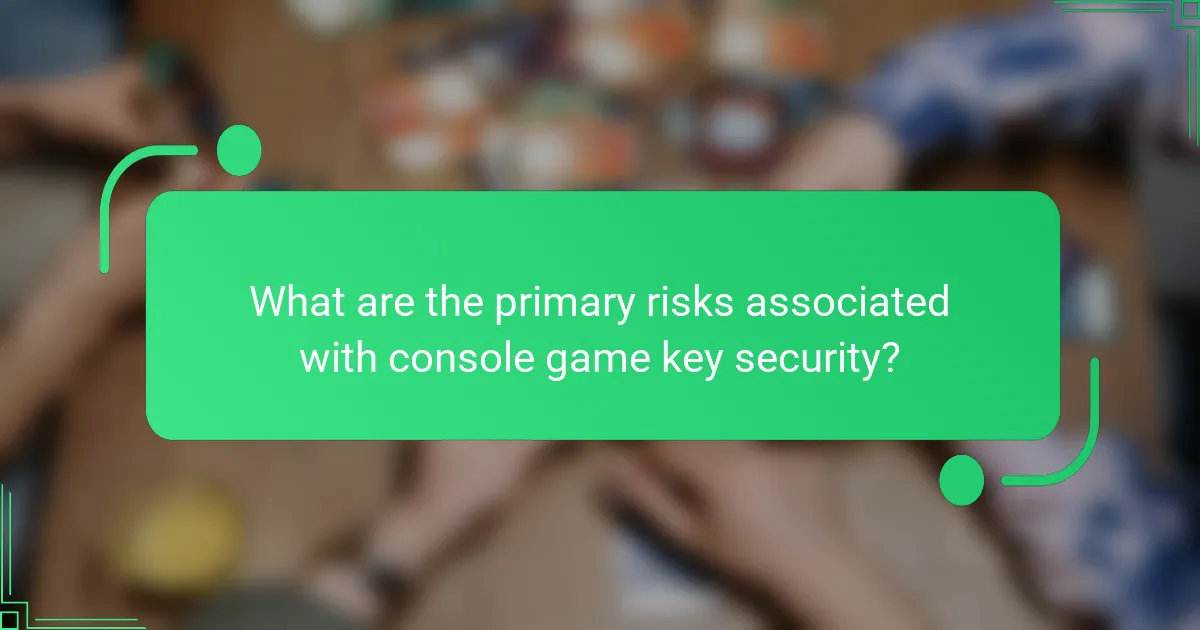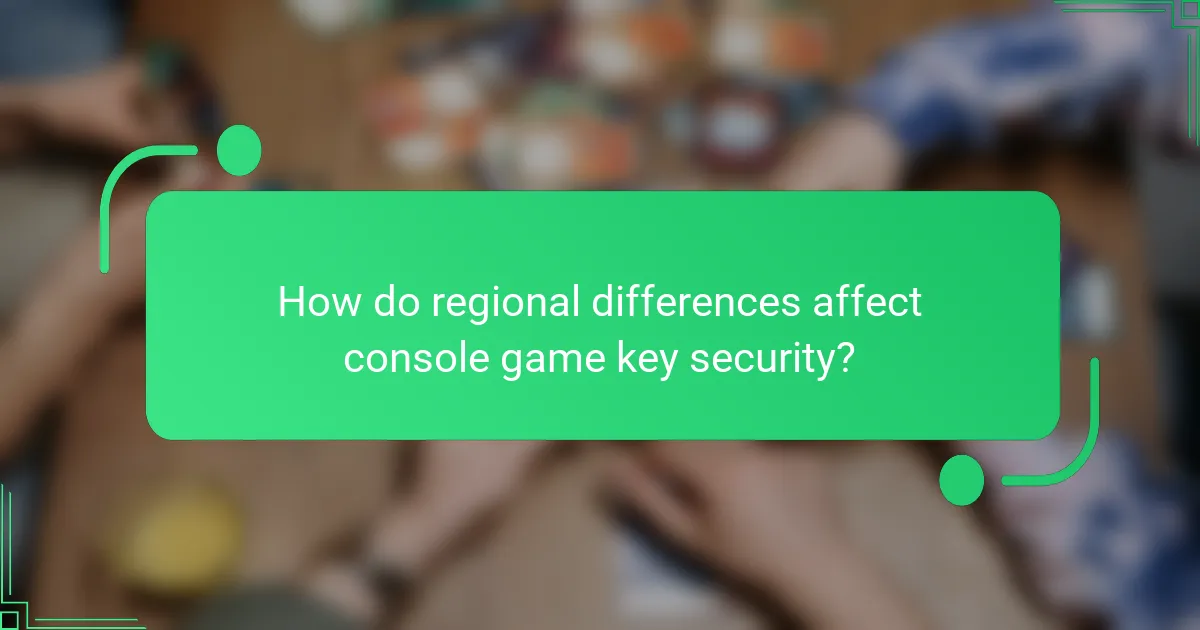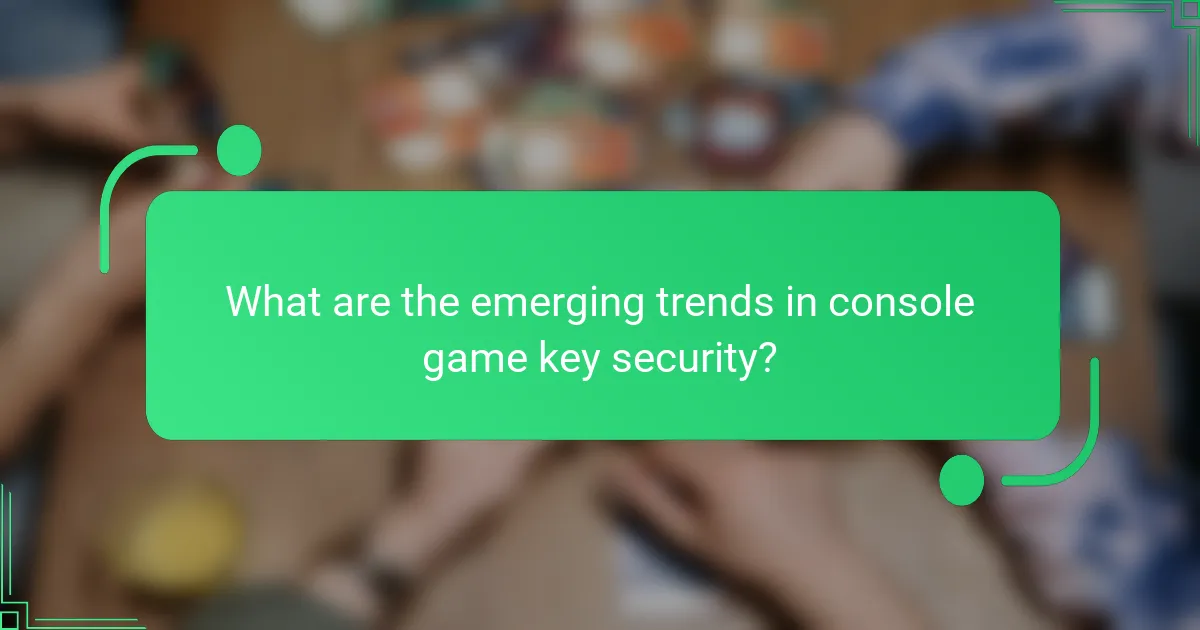Console game key security is crucial for protecting gamers and developers from financial losses and data breaches. This article explores the risks of unauthorized access and key theft, best practices like two-factor authentication, and the impact of regional differences on security. It also examines technological solutions such as encryption and blockchain, along with emerging trends in AI-driven fraud detection. Understanding these elements is essential for maintaining a secure gaming environment.

What are the primary risks associated with console game key security?
The primary risks associated with console game key security include unauthorized access, key theft, and account hacking. These risks can lead to financial losses and compromised user data. Additionally, phishing attacks targeting gamers are increasingly common, exploiting trust to gain sensitive information. Implementing strong security measures like two-factor authentication can mitigate these risks effectively.
How do phishing attacks compromise game key security?
Phishing attacks compromise game key security by tricking users into revealing sensitive information. Attackers often use fake emails or websites that mimic legitimate platforms, leading to unauthorized access to accounts and keys. This can result in financial loss and unauthorized game access. To mitigate risks, users should enable two-factor authentication, verify sources before sharing information, and regularly update passwords.
What role do unauthorized sellers play in security vulnerabilities?
Unauthorized sellers significantly increase security vulnerabilities in console game key distribution. They often sell counterfeit or stolen keys, leading to potential account bans and loss of access. These sellers may also compromise user data through phishing schemes or malware. Legitimate retailers implement security measures that unauthorized sellers typically avoid, such as secure payment processing and customer support. Users should prioritize purchasing from authorized sources to mitigate these risks.
Which common user behaviors increase security risks?
Common user behaviors that increase security risks include using weak passwords, sharing account information, ignoring software updates, and clicking on suspicious links. These actions compromise console game key security by exposing accounts to unauthorized access and potential fraud.

What best practices can enhance console game key security?
To enhance console game key security, implement strong password practices, use two-factor authentication, and avoid sharing keys. Regularly update software and monitor for suspicious activity. Educating users on phishing risks also strengthens security.
How can users verify the legitimacy of game key sources?
Users can verify the legitimacy of game key sources by checking for trusted retailers, reading user reviews, and confirming the availability of customer support. Trusted sources typically have established reputations and offer secure payment methods. Users should also look for clear refund policies and transparency about the origin of keys. Avoiding unfamiliar websites and relying on community recommendations can further enhance security.
What security measures should be implemented during key purchases?
Implement strong security measures during key purchases to protect against fraud. Use reputable platforms, enable two-factor authentication, and verify seller credentials. Always check for secure payment methods and avoid public Wi-Fi when making transactions. Regularly monitor accounts for unauthorized activity to mitigate risks.
Which password management strategies improve security?
Implementing strong password management strategies significantly enhances console game key security. Use unique passwords for each account, enable two-factor authentication, and regularly update passwords.
Utilize password managers to generate and store complex passwords securely. Avoid using easily guessable information, such as birthdays or common phrases. Regularly review account activity for unauthorized access as a precaution.

How do regional differences affect console game key security?
Regional differences significantly impact console game key security by influencing the prevalence of fraud, distribution practices, and legal regulations. Regions with strict enforcement of digital rights management often experience lower rates of key theft. Conversely, areas with lax regulations may see higher instances of unauthorized key sales, increasing risks for consumers and developers. The variations in currency exchange rates also affect key pricing and can lead to exploitation through regional pricing arbitrage. Understanding these dynamics is essential for implementing effective security measures tailored to specific markets.
What unique security challenges are faced by users in different regions?
Users in different regions face unique security challenges related to console game key security. Regional factors such as internet infrastructure, local laws, and prevalent cyber threats influence these challenges.
For instance, users in regions with high rates of piracy may encounter increased risk of counterfeit keys. In contrast, areas with stringent data protection laws may experience challenges related to compliance and user privacy. Additionally, regions with less robust cybersecurity awareness can lead to higher susceptibility to phishing attacks targeting game keys.
Understanding these regional variations is crucial for implementing effective security practices tailored to specific threats.
How do cultural attitudes towards gaming influence security practices?
Cultural attitudes towards gaming significantly impact security practices by shaping user behavior and expectations. In cultures that view gaming as a serious pursuit, there is often a heightened awareness of security risks associated with console game keys. Gamers in these cultures are more likely to adopt best practices, such as using two-factor authentication and avoiding suspicious links. Conversely, in cultures where gaming is seen as a casual activity, users may neglect security measures, leading to higher risks of key theft. This disparity highlights the importance of tailoring security education to cultural contexts for effective risk mitigation.

What technological solutions are available for securing game keys?
Technological solutions for securing game keys include encryption, digital rights management (DRM), and secure servers. These methods help prevent unauthorized access and distribution of keys.
Encryption ensures that game keys are stored and transmitted securely, making them difficult to intercept. DRM systems control the use of keys, allowing legitimate users to access games while blocking piracy. Secure servers provide a centralized location for key management, reducing the risk of theft.
Implementing these solutions minimizes risks associated with key sharing and counterfeiting, thereby protecting both developers and consumers.
How does two-factor authentication enhance key security?
Two-factor authentication significantly enhances console game key security by adding an extra layer of protection. It requires users to provide two forms of verification, typically something they know (like a password) and something they have (like a mobile device). This dual requirement makes it much harder for unauthorized users to access accounts, even if they have obtained the password.
Additionally, two-factor authentication can reduce the risk of key theft from phishing attacks. By requiring a second verification step, it limits the effectiveness of stolen credentials. Implementing this security measure can lead to a marked decrease in account compromises, ensuring that game keys remain secure.
What role do encryption methods play in protecting game keys?
Encryption methods play a crucial role in protecting game keys by securing them against unauthorized access and piracy. These methods use algorithms to encode game keys, ensuring that only legitimate users can access and utilize them. Strong encryption techniques, such as AES or RSA, provide a high level of security, making it difficult for hackers to decrypt the keys without the proper authorization. As a result, implementing robust encryption practices is essential for maintaining the integrity and value of console game keys.

What are the implications of compromised game keys for users?
Compromised game keys can lead to unauthorized access, account bans, and loss of purchased content. Users may face financial risks and diminished gaming experiences. Implementing robust security practices, such as two-factor authentication and secure storage, can mitigate these risks. Regularly updating passwords and being cautious with key sharing further enhances protection against key compromise.
How can compromised keys affect user accounts and data?
Compromised keys can lead to unauthorized access, resulting in the theft of user accounts and sensitive data. This risk increases if users do not implement strong security measures. Compromised keys may allow attackers to misuse accounts for fraudulent transactions or to distribute malware. As a result, protecting console game keys through robust security practices is essential to safeguard user information and maintain trust.
What steps should users take if their game key is compromised?
If a game key is compromised, users should immediately change their account password, enable two-factor authentication, and contact customer support for assistance. Additionally, monitor account activity for unauthorized transactions and consider reporting the incident to relevant authorities.
1. Change your account password.
2. Enable two-factor authentication.
3. Contact customer support.
4. Monitor account activity.
5. Report the incident if necessary.

What are the emerging trends in console game key security?
Emerging trends in console game key security focus on enhanced encryption, blockchain technology, and AI-driven fraud detection. These innovations aim to protect digital assets and prevent unauthorized access.
The adoption of blockchain offers a decentralized approach, increasing transparency and traceability of game keys. AI algorithms analyze user behavior, identifying anomalies that may indicate fraud, thus improving security measures.
Additionally, multi-factor authentication is gaining traction, adding layers of protection for users. As digital distribution grows, these trends are essential for safeguarding the integrity of console gaming.
Overall, these developments reflect a proactive stance against evolving threats in the gaming industry.
How are new technologies shaping the future of game key security?
New technologies are enhancing game key security by implementing advanced encryption and blockchain solutions. These innovations provide greater protection against unauthorized access and counterfeiting. Enhanced authentication methods, such as biometric verification, also contribute to more secure transactions. As a result, developers and consumers benefit from increased trust and reduced fraud risks in the gaming industry.
What innovative practices are being adopted by gaming companies?
Gaming companies are adopting innovative practices to enhance console game key security. These include implementing advanced encryption methods, utilizing blockchain technology for key management, and adopting multi-factor authentication systems.
Advanced encryption ensures that game keys are securely stored and transmitted, reducing the risk of unauthorized access. Blockchain technology provides a decentralized ledger for tracking key ownership and transfers, enhancing transparency and trust. Multi-factor authentication adds an extra layer of security, requiring users to verify their identity through multiple means before accessing game keys.
As a result, these practices significantly mitigate risks associated with key theft, fraud, and piracy, ultimately protecting both developers and consumers.
What can users expect in terms of security advancements in 2025?
In 2025, users can expect significant advancements in console game key security, focusing on enhanced encryption and multi-factor authentication. These improvements aim to reduce the risk of key theft and unauthorized access. New technologies, such as blockchain, may also be employed to ensure the authenticity and traceability of game keys. Additionally, developers will likely implement more robust monitoring systems to detect and mitigate fraudulent activities in real-time.
What expert tips can help maintain optimal game key security?
To maintain optimal console game key security, follow these expert tips. Use strong, unique passwords for accounts and enable two-factor authentication. Regularly update software to protect against vulnerabilities. Avoid sharing keys or account details with others. Be cautious of phishing attempts and only purchase keys from reputable sources. Store keys in a secure password manager to prevent unauthorized access.



